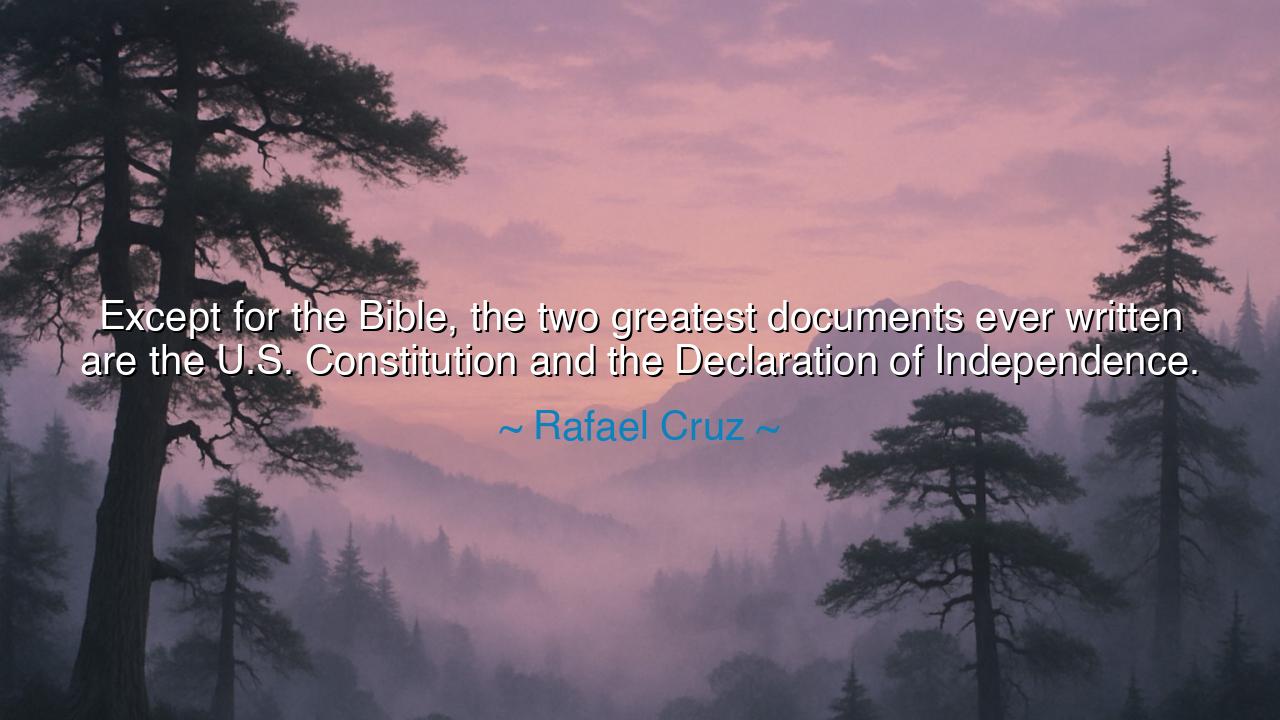
Except for the Bible, the two greatest documents ever written are
Except for the Bible, the two greatest documents ever written are the U.S. Constitution and the Declaration of Independence.






“Except for the Bible, the two greatest documents ever written are the U.S. Constitution and the Declaration of Independence.” Thus spoke Rafael Cruz, a man whose faith and reverence for freedom intertwine like the threads of an ancient tapestry. His words are not a mere comparison of texts, but a recognition of the spiritual foundation upon which nations rise and civilizations endure. For in the Bible, humanity finds divine truth — and in the Declaration of Independence and the U.S. Constitution, mankind’s attempt to shape that truth into governance, justice, and liberty. Cruz’s statement is an exaltation of the written word — of the sacred power of ideas that bind heaven and earth, belief and law, soul and society.
The Bible, the oldest and holiest of scriptures, has long been the moral compass of civilizations. Its pages speak of creation, freedom, sacrifice, and redemption — the eternal struggles of the human heart. It teaches that all men and women are created in the image of God, and that the essence of justice is love tempered by truth. From these teachings emerged the concept that human beings possess inherent worth — a flame of divine origin that no ruler or empire may extinguish. When Cruz places the Declaration of Independence and the Constitution beside this sacred text, he acknowledges that these documents were born of the same spiritual soil — that they too proclaim the dignity of man and the sanctity of freedom.
The Declaration of Independence, penned by Thomas Jefferson and adopted in 1776, is not merely a political manifesto; it is a covenant written in the language of eternity. Its authors did not declare war merely against a king, but against tyranny itself — the ancient shadow that has darkened every age. When Jefferson wrote, “All men are created equal, endowed by their Creator with certain unalienable Rights,” he echoed the timeless truth of Scripture — that liberty is not granted by governments but given by God. That document was, in truth, the first great sermon of modern democracy, a bold proclamation that power must kneel before principle and that freedom, once kindled, can light the world.
But where the Declaration proclaimed freedom, the Constitution preserved it. When the smoke of revolution cleared, and the fervor of rebellion gave way to the need for order, the framers gathered in 1787 to craft a structure worthy of their ideals. The U.S. Constitution became the living vessel of liberty — a design both sturdy and adaptable, woven with checks and balances, guided by the belief that government must serve, not enslave. It was a work of divine balance, a covenant among men echoing the covenants of old, where promises were bound not by power, but by honor and accountability. It gave shape to the dream that the Declaration had breathed to life.
Cruz’s reverence for these three texts — the Bible, the Declaration, and the Constitution — speaks to a truth that transcends time: that freedom, morality, and faith are not separate pursuits, but branches of the same tree. Each draws strength from the others. Without the Bible’s moral compass, freedom drifts into chaos. Without the Declaration’s courage, faith remains abstract. Without the Constitution’s wisdom, both ideals wither in the storms of power. Together, they form a trinity of truth — a map for both nations and souls seeking righteousness.
Consider the life of Abraham Lincoln, who, amid the fires of the Civil War, drew upon all three. He read the Bible for solace, the Declaration for inspiration, and the Constitution for guidance. It was these pillars that sustained him as he fought to preserve the Union and abolish slavery. When he stood at Gettysburg and spoke of “a new birth of freedom,” he invoked the spirit of Scripture and the founding fathers alike. His leadership was proof that nations endure not by might, but by the moral strength of their principles — principles born from the union of faith and freedom that Cruz exalts.
The lesson, then, is as eternal as it is urgent: liberty must be guarded by both law and virtue. A nation that forgets the moral foundation of its freedom soon becomes enslaved by its appetites. The Bible teaches us what is right; the Declaration reminds us why we must act; the Constitution tells us how to preserve what we have built. To read them together is to see the full circle of human responsibility — from God to conscience, from conscience to society, from society back to God.
So let this teaching be passed down: revere not only the freedom you inherit, but the wisdom that sustains it. Read the Bible to know the soul’s purpose, the Declaration to know the heart’s courage, and the Constitution to know the mind’s discipline. For these three — faith, freedom, and law — are the sacred texts of a civilization that sought to honor both heaven and earth. Guard them well, live by their spirit, and you will carry forward the light of all who have ever believed that mankind, though flawed and frail, was meant to be free.






AAdministratorAdministrator
Welcome, honored guests. Please leave a comment, we will respond soon